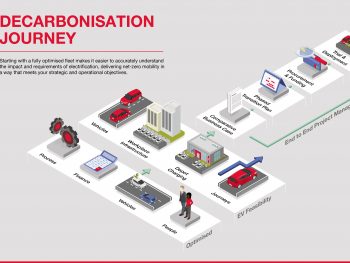Hitachi develops intelligent fleet decarbonisation solutions
Hitachi Capital Vehicle Solutions (HCVS) is co-developing new ‘Intelligent Fleet Decarbonisation’ tools to help fleets make the switch to electric vehicles.
The business, a division of Hitachi Capital (UK) Plc, has signed a three-year partnership with Hitachi Europe Ltd, a wholly owned subsidiary of Hitachi Ltd, to collaborate on net-zero solutions.
Two solutions have already been developed, known together as ‘Intelligent Decarbonisation’ and aimed at helping large commercial and public transport fleets simplify and de-risk the process of conversion to EVs; either in full or in part.
The holistic service builds the business case for conversion based upon total cost of ownership comparisons and vehicle sourcing and financing options. It covers all types of vehicles, from cars and vans to trucks and buses, and looks at a range of factors including the size and age of the existing fleet, the suitability of the depot for conversion and the requirements for grid infrastructure, energy management and driver training.
Jon Lawes, managing director at Hitachi Capital Vehicle Solutions, commented: “This partnership enables us to accelerate the transition to alternatively fuelled vehicles for fleets of all shapes and sizes; from managing large scale transition ICEs to BEVs to fleet optimisation and EV depot charging solutions. We’re solving society’s challenges to decarbonise vehicles, safely, whilst saving costs. In addition to our partnership with Gridserve to build better charging infrastructure, we offer a unique solution to make electrification a reality for our customers.”
Ram Ramachander, chief commercial officer, social innovation business EMEA and chief digital officer, Hitachi Europe Ltd, added: “Our collaboration with Hitachi Capital Vehicle Solutions is testament to the power of co-creation. Together we have created innovative new solutions that help fleet owners cut costs and carbon. We look forward to continuing this partnership into the future and incubating new business models.”


